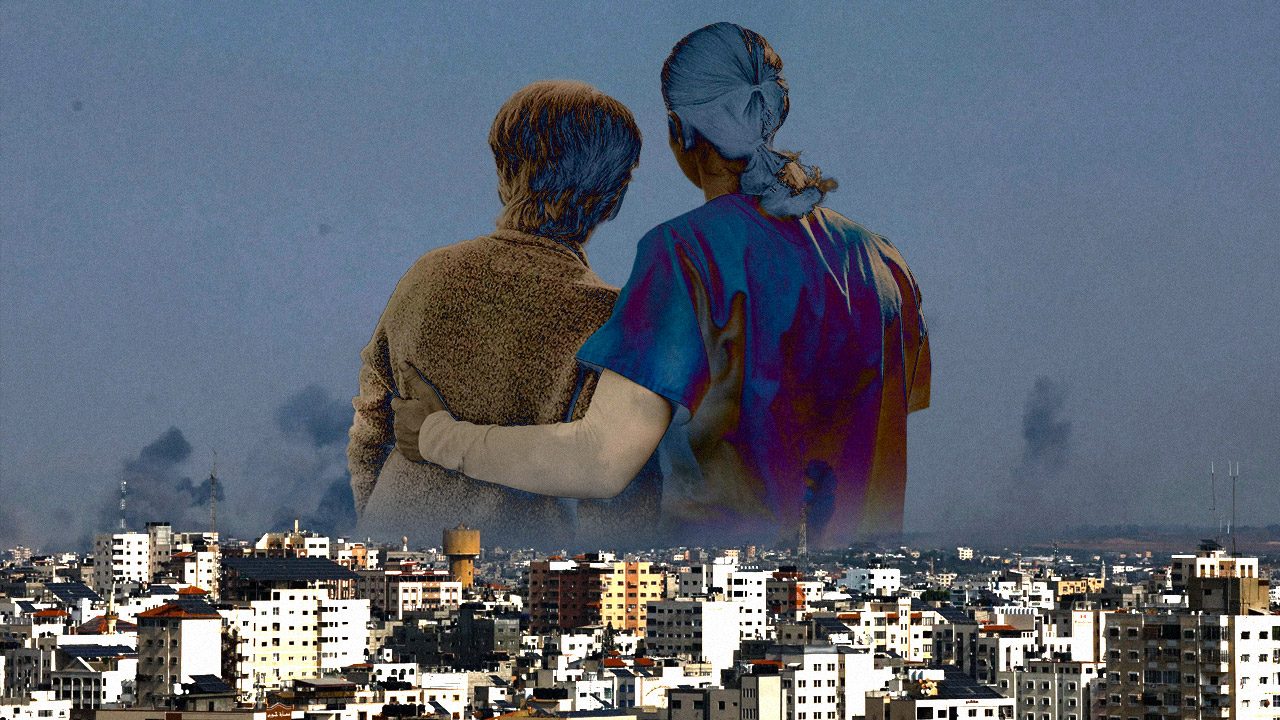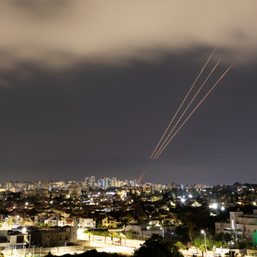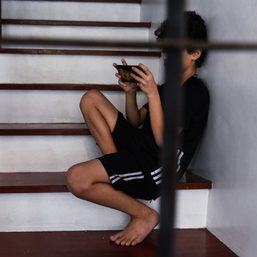SUMMARY
This is AI generated summarization, which may have errors. For context, always refer to the full article.

MANILA, Philippines – On what seemed like an ordinary Saturday morning in Israel, 25-year-old Filipino caregiver Irene Repuela woke up to the jarring sound of her phone’s alarm. As her eyes focused on the screen, she was jolted by the message: a rocket missile was headed for their area.
In a flash, Repuela jumped out of bed and hurried to the side of her employers, an elderly Israeli-American couple, and led them both to the bomb shelter built inside their home.
From the window, Repuela heard people gripped with panic shouting on the streets.
She saw men on motorcycles who were armed with long guns. They were Israeli soldiers, she thought, because of their proximity to an army base. When she returned to her employers, gunshots rang out and their home was being fired upon, shattering the window.
“After po doon, may nakikita na akong shadow ng tao sa main door namin kasi nilo-lock namin iyon before matulog. Finorce nila i-open iyong pinto, hindi mabuksan, so pinutukan nila iyong main door namin,” Repuela said.
(After that, I saw a shadow of a person at our main door because we locked it before going to bed. They tried to forcefully open the door, but it wouldn’t budge, so they ended up shooting our main door.)
Without a moment’s hesitation, Repuela swiftly retrieved her employer from the bathroom and hurried to the bomb shelter. The armed men, alerted to their presence, wasted no time in infiltrating their flat.
“So iyong mga nasa labas [na mga Hamas], pumasok. Nakita kami na sinarado ang pinto, doon na yung time na pinutukan po kami,” she said.
(So the people outside [the Hamas members] entered. They saw that our door was closed, and that’s when they started shooting at us.)
Inside the bomb shelter, the sound of gunshots outside could be heard, but Repuela and her elderly were safe. However, a subtle sense of unease began to settle over her.
“Nasabi ko na, ‘OK po kung ngayon na ang huling araw ko tatanggapin ko na po ito’,” she said.
(I said, ‘Okay, if today is my last day, I’ll accept this.)
In the name of duty
Repuela is one of the roughly 23,754 overseas Filipino workers (OFW) in Israel who are employed mainly in roles such as caregivers, service sector employees, and hotel workers, based on the August 2022 data from the Department of Migrant Workers (DMW).
On October 7, the Palestinian Islamist group Hamas launched a surprise attack on Israel, the most recent development in a long-standing conflict. (READ: FAST FACTS: Hamas, the Palestinian militant group ‘at war’ with Israel)
Hamas militants breached borders, entered towns and bases controlled by Israeli forces near the Gaza Strip, where they took several hostages.
On the same day, Israeli Prime Minister Benjamin Netanyahu declared war on Hamas and initiated airstrikes.
Within the confines of the bomb shelter, Repuela and her old employers endured an agonizing 35-hour wait, with the sound of gunshots reverberating outside, a grim reminder of the harrowing violence unfolding.

“Napakahirap noong nasa loob ka lang tapos gutom na gutom ka na, tapos may dalawa ka pang matanda na kasama na kailangan din kumain. Naguguluhan ka kasi sa labas ng bahay ninyo may mga tao, may mga nagpapaputok,” she said.
(It’s very difficult when you’re inside, feeling extremely hungry, and you also have two elderly people with you who need to eat. You’re confused because, outside your house, there are people and gunshots going off.)
During what was the longest wait of her life, Repuela could not help but contemplate a new path. After 13 months, it is time to leave Israel and come home to the Philippines, she told her employers.
“Pagkasabi ko noon sa employer ko, nakita kong nalungkot siya. Kaya sinabi ko na ok ano mang mangyari, magsi-stay ako para sa kanila,” she said.
(When I told that to my employers, I saw they got sad. So I said that no matter what happens, I will stay for them.)
On the other side of Tel Aviv another OFW, Ricasol Garcia, a hotel worker, was anxious about her safety in the days following the attack. Nonetheless, her dedication to her guests’ welfare remained unwavering, motivating her to persist in her duties despite the difficult situation.
“At work, we faced a series of back-to-back strikes. Our primary concern remained the safety of the guests. We swiftly escorted them to the basement bomb shelter room. Even in the midst of fear, you can’t forget the guests in your care,” she said.
Despite her resolve, Garcia admitted that she could not shake her fear for her life, particularly in the light of distressing reports that fellow Filipinos lost their lives in the ongoing turmoil.
At least three Filipinos have been confirmed killed so far in southern Israel, according to the Philippine government. They worked as caregivers and died with their employers, with one still unidentified.
“Kakabahan ka, matatakot ka, iiyak at iiyak ka. Lakasan talaga ng loob. Kailangan mo talaga lakasan ang loob mo kapag nag-OFW ka lalo na kapag sa ganitong bansa ka napunta,” she said.
(You’ll be nervous, scared, you’ll keep on crying. You really need to be brave. You really need to be brave when you’re an overseas Filipino worker, especially when you are in a country like this.)
In the heart of central Tel Aviv, Kathleen Tolentino was looking after her dementia-afflicted 91-year-old employer. As the attack began, she wrestled with panic and confusion because their house lacked a bomb shelter.
In a tense moment, Tolentino answered the call from her employer’s child, who directed her to leave the older person and head to the nearest bomb shelter.
“Naiyak na lang ako. Sabi ko, I can’t leave her, hindi ko siya kayang iwan. Tayong mga Pilipino mapagmahal sa mga lolo at lola, hindi ko kayang gawin iyon,” she said.
(It made me cry. I said, ‘I can’t leave her, I can’t abandon her.’ We Filipinos are loving towards our grandparents, and I can’t do that.)
As the days passed, Tolentino’s heart was filled with fear but she remained by her employer’s side, hoping that the sound of gunshots fired and explosion of missiles would eventually come to an end.
Leaving with no choice
In the midst of the harrowing accounts of Israeli neighborhoods being devastated and residents taken as hostages by the assailants from Hamas, the plight of the tens of thousands of Filipino migrant workers in Israel has frequently gone unnoticed.
There are at least 30,000 Filipinos in Israel and over 100 in the Gaza Strip, said by the Philippine government.
The Philippines has set Alert Level 3 for Gaza, making repatriation optional. However, the challenge lies in finding a feasible means for their departure.
Joanna Concepcion, chairperson of Migrante International, emphasized the necessity for the Philippine government to prepare a job placement program for OFWs who will be returning from Israel.
“This eruption of the Israeli-Palestinian conflict is yet another wake-up call for the Marcos regime to create decent jobs at home by developing the country’s agriculture and industries,” she said.
Tolentino’s desire is to return to the Philippines, with the hope of not only coming home safely but also reuniting with her family.
She explained, “I had originally intended to head back to the Philippines in November and then return here to fulfill my contract, of course. However, if this situation persists, I may reconsider returning and instead resume my teaching career.”
As for Garcia, she is ready to go to great lengths just to support her family.
“You know, when you find yourself in a situation where you have to work because you’re providing for someone, you just need to muster your courage and have faith in God, believing that you can overcome this – you just keep fighting,” Garcia said.
Repuela expressed that if given a secure job back in the Philippines, she would gladly return home. But this being far from an option, she’s willing to stay where she is, even if it means risking her life.
“Everytime I close my eyes, I can vividly recall the events from beginning to end, as if they happened just yesterday. Pero at the same time, nagpe-pray ka na ‘Lord ikaw na po ang bahala, kung ano man pong mangyari tatanggapin ko po. Ikaw na po ang bahala sa mga anak ko,” she said.
(But at the same time, you pray, ‘Lord, it’s in Your hands now. Whatever happens, I will accept it. You are in charge of my children.’) – Rappler.com
1 comment
How does this make you feel?
![[PANOORIN] Mga pagsabog sa Israel, dinig sa interview ng OFW](https://i.ytimg.com/vi/JwyFedU5nys/hqdefault.jpg)












![[New School] The PH government should support the ICJ’s ruling against Israel](https://www.rappler.com/tachyon/2024/02/right-side-history-icj-february-21-2024.jpg?resize=257%2C257&crop=422px%2C0px%2C1080px%2C1080px)



So sad, that our OFWs prefer to stay there despite the danger because they cannot find a secure job back home.